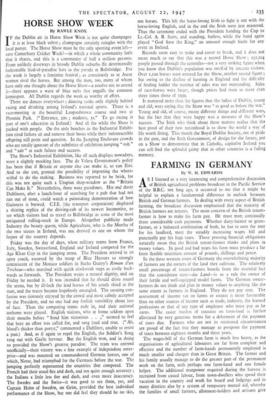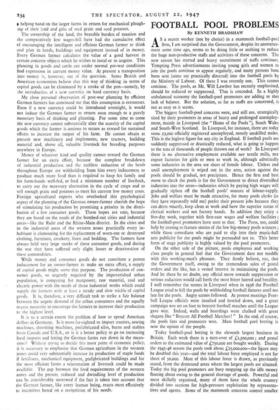FARMING IN GERMANY
By W. H. EDWARDS
AS I listened to a very interesting and comprehensive discussion of British agricultural problems broadcast in the Pacific Service of the B.B.C. not long ago, it occurred to me that it might be helpful to explain a fundamental difference in outlook between British and' German farmers. In dealing with every aspect of British farming, the broadcast discussion emphasised that the majority of British farmers are tenants. The main concern of the British tenant- farmer is how to make his farm pay. He must meet continually three considerable cash payments. Whether dairy-farmer or grain- farmer, or a balanced combination of both, he has to earn the rent for his landlord, meet the steadily increasing wages bill and punctually pay his high taxes. These pressing financial obligations naturally mean that the British tenant-farmer thinks and plans in money values. In good and bad years his farm must produce a far from flexible minimum amount of pounds, shillings and pence.
In the three western zones of Germany the overwhelming majority of farmers are the owners of the land they cultivate. The relatively small percentage of tenant-farmers benefit from the essential fact that the considerate state—das Land—is as a rule the owner of their fertile and well-equipped model farms. The German owner- farmers do not think and plan in money values to anything like the same extent as farmers in England. They do not pay rent. The assessment of income tax on farms or estates is more favourable than on other sources of income such as trade, industry, the learned professions or that of any type of employee who must pay as he earns. The easier burden of taxation on farm-land is further alleviated by very generous terms for a deferment of the payment of taxes due. Farmers who are not in straitened circumstances are proud of the fact that they manage to postpone the payment of taxes between eighteen months and three years.
The wages-bill of the German farm is much less heavy, as the organisations of agricultural labourers are far from complete and effective and the number of farm-hands permanently employed is much smaller and cheaper than in Great Britain. The farmer and his family usually manage to do the greater part of the permanent work on the farm, with perhaps one farm-hand and one female helper. The additional manpower required during the harvest is recruited from casual labour, from town-dwellers who spend their vacation in the country and work for board and lodgings and in many districts also by a system of temporary mutual aid, whereby the families of small farmers, allotment-holders and artisans give
R helping hand on the larger farms in return for mechanical plough- ing of their land and gifts of seed grain and seed potatoes.
The ownership of the land, the bearable burden of taxation and the comparatively low wages-bill have had the cumulative effect of encouraging the intelligent and efficient German farmer to think and plan in herds, buildings and equipment instead of in money. Every German farmer calculates the value of a good harvest in certain concrete objects which he wishes to instal or to acquire. This planning in goods and cattle can under normal pre-war conditions find expression in current money value. At present a transposition into money is, however, out of the question. Some British and American economists believe that this way of thinking in terms of capital goods can be eliminated by a stroke of the pen—namely, by the introduction of a new currency on hard currency basis.
My close personal observation of post-war planning by efficient German farmers has convinced me that this assumption is erroneous. Even if a new currency could be introduced overnight, it would not induce the German farmer to return soon enough to a -purely monetary basis of thinking and planning. For some time to come the new currency cannot substantially alter the scarcity of the capital goods which the farmer is anxious to secure as reward for sustained efforts to increase the output of his farm. He cannot obtain at present new machinery and implements, new tractors, building material and, above all, valuable livestock for breeding purposes anywhere in Europe.
Money of whatever kind and quality cannot reward the German farmer for an extra effort, because the complete breakdown of industrial production and the ruthless reduction of the herds throughout Europe are withholding from him every inducement to produce much more food than is required to keep his family and his farm-hands well-fed, to feed a minimum number of liveskock, to carry out the necessary alternation in the cycle of crops and to sell enough grain and potatoes to meet his current low money costs. Foreign agricultural experts who overlooked this psychological aspect of the planning of the German owner-farmer cherish the hope of stimulating his production by promising a priority in the distri- bution of a few consumer goods. These hopes are vain, because they are based on the needs of the bombed-out cities and industrial areas—like the Ruhr and the Rhine-Main district. In the cities and in the industrial areas of the western zones practically every in- habitant is clamouring for the replacement of worn-out or destroyed clothing, furniture, crockery, linen and bedding. The farmers have always held very large stocks of these consumer goods, and during the war they have suffered only slight losses or deterioration of these commodities.
While money and consumer goods do not constitute a potent inducement for an owner-farmer to make an extra effort, a supply of capital goods might serve that purpose. The production of con- sumer goods, so urgently required by the impoverished urban population, is competing for manpower, raw material, coal and electric power with the needs of those industrial works which could supply the farmers with at least a steady and slow trickle of capital goods. It is, therefore, a very difficult task to strike a fair balance between the urgent demand of the urban consumers and the equally urgent necessity to encourage the farmers to increase their production to the highest level.
It is to a certain extent the problem of how to spend American dollars in Germany. Is it more far-sighted to import tractors, sowing machines, threshing machines, prefabricated silos, barns and stables from Canada and U.S.A., or is it a better policy to go on increasing food imports and letting the German farms run down in the mean- time? Without trying to decide this moot point of economic policy, it is necessary to emphasise that German agriculture in the western zones could very substantially increase its production of staple foods if fertilisers, mechanical equipment, prefabricated buildings and for the most efficient farms a rejuvenation of livestock could be made available. The gap between the food requirements of the western zones and the present reduced and dwindling level of production can be considerably narrowed if the fact is taken into account that the German farmer, like every human being, reacts most effectively to incentives based on a recognition of his needs.



































 Previous page
Previous page